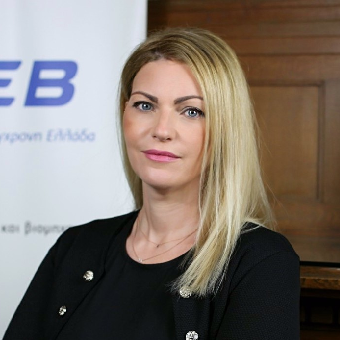
Labour Market, Skills & Social Affairs
Human resources’ development and adaptation to rapid technological change, within an efficiently functioning labour market is crucial for growth and competitiveness. SEV develops policy proposals and initiatives for education, training and skills in addition to social policy and social security issues. As official social partner, SEV also participates in bipartite and tripartite national social dialogue.
SEV focuses on creating sustainable, job-rich economic growth through structural labour market reform.
- Modern Skills, Education and Training for Internationally Competitive Businesses
- Competitive labour market environment to increase productivity
- The future of work: Digitalisation and the labour market
- Strengthening and enriching social dialogue
- Investing in skills development to increase labour productivity and employment participation: Education and training, and investment in skills’ development is an important driver of productivity growth. Improved skills’ training policy frameworks and life-long learning policies will encourage companies and workers to invest in developing skills that fit labour markets’ requirements and unlock labour productivity. Tailoring education and training to address significant skill shortages and mismatches, will help both workers and businesses. In addition, Greece’s ability to remain competitive is also directly connected to high-level STEM skills (Science, Technology, Engineering and Mathematics).
- Labour Market environment and wages need to be sustainable to maintain competitiveness and prevent job losses. SEV promotes policies that can raise long term productivity and reduce the tax wedge on labour. We strive to encourage job creation, through supporting innovation, accessing new markets, and skills for the digital era in key industries of the Greek economy, such as manufacturing.
- The future of work depends upon structural changes and adaptation to the challenges of the digital revolution which present an opportunity to create a new generation of jobs, and tasks, that will replace those lost through automation. Shifting consumer preferences mean that entire production chains may be reorganized and relocated, while automation is also creating new jobs altogether.
- Social Dialogue is a cherished tradition, and it is important to ensure that national collective bargaining frameworks, including the respective role and coordination of sectoral and company bargaining, are geared towards productivity gains for resilience and competitiveness. Effective social dialogue requires strong, independent workers’ and employers’ organizations with both the technical capacity and access to all pertinent information. SEV is committed to strive for the respect of fundamental rights of freedom of association and collective bargaining and an enabling legal and institutional framework.
- Social Affairs Committee: The Committee sets the strategic direction concerning labour market and human resources development. Comprised of highly experienced and motivated Human Resources Directors, it develops and promotes policy positions, and initiatives on Labour Law and labour market issues. The Committee also works with various ad hoc working groups for specific technical issues.
- Human Resources’ Working Group develops policy recommendations and fosters policy debate on a wide variety of labour market issues (active labour market policies, education and skills, youth employment, skills strategies, vocational education and training and training tools, etc.).
- Health and Safety Working Group deals with all issues related to health and safety at work and stresses the employers’ legal obligations to ensure a safe and healthy workplace for their employees.
- Be connected by participating in one of the Working Groups (Human resources, Health and Safety at work).
- Participate in consultations and influence policy in cooperation with SEV’s Social Affairs Committee.
- Access information and network through exclusive events and high-profile speakers and participants.


